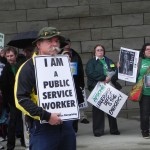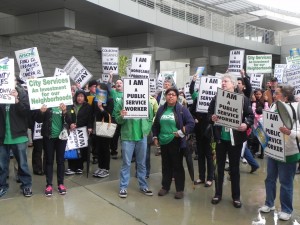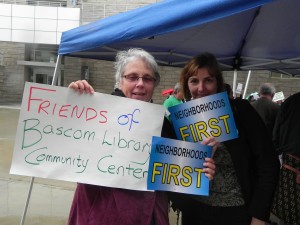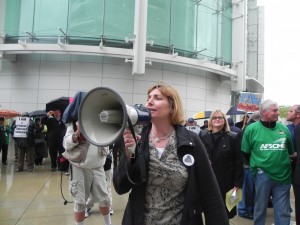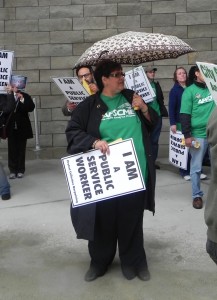Hundreds of neighborhood leaders and city employees joined forces in the rain on Tuesday at a rally outside San Jose City Hall to protest proposed cuts to neighborhood services and Mayor Chuck Reed’s plan to declare a fiscal emergency that could lead to a ballot measure on pension limits.
Rally participants, mostly members of the city’s largest employees unions, the Municipal Employees Federation, also testified at the evening budget hearing that the city has been blaming its financial woes on employee costs instead of exploring other ways to fill a $115 million budget gap and bring in new revenue.The rally cry of “Neighborhoods First,” along with familiar union chants, was aimed at showing city officials that the community and city workers were united in opposing proposed cuts that include closing branch libraries four days a week, slashing funds for youth programs and eliminating the jobs of 195 police officers and 64 firefighters.
“The council needs to start putting neighborhoods first and not pitting the community against each other,” said Cindy Chavez, former city council member and executive officer of the South Bay Labor Council.
At community budget meeting held recently across San Jose, Reed has identified escalating pension costs as the primary driver of 10 years of budget deficits. This year the cost is $63 million and is expected to climb to $400 million in five years.
These costs, along with the economic downturn, has forced the city to propose laying off about 10 percent of its workforce and making severe cuts in neighborhood services. Employees are also being asked to take a 10 percent cut in wages and benefits. So far, the city and four of the 11 employee unions have reached agreements. More deeper budget cuts are promised if agreements that include concessions aren’t reached.“We are here to work with you,” neighborhood leader Helen Chapman told the crowd. “Never give up.”
Lee Saunders, Secretary-Treasurer of AFSCME International, referred to Wisconsin, where the legislature has approved measures to strip unions of collective bargaining rights to help close a state budget deficit.
“San Jose will not become the Wisconsin of the West,” Saunders said. “We will not let that happen. I really believe there’s a better way to meet those budget challenges than going nuclear and declaring a crisis.”
Inside City Hall, San Jose City Council members listened to more than 50 speakers who ranged from city union members accusing the city of unfair bargaining to residents who fear the proposed cuts to neighborhoods will threaten their children’s safety.“I’m tired of hearing Chuck Reed blame city employees for this deficit,” said city worker Gary Sandoval. “They spent their money foolishly. We aren’t the reason you’re in this deficit.”
Said employee Mark Ruffington: “You need to provide real leadership. Cutting city services is not the answer and blaming city employees is not the answer.”
Like many of the residents who have been speaking out at community budget meetings, Rita Espino is concerned about closing libraries and community centers to balance the budget.
“I’m worried because these cuts because these are some of the services my children and I use the most,” she said in Spanish. “I’m supporting the solutions here tonight.
Those solutions, which are estimated to save $17 million, were proposed by a San Jose Community Budget Working Group and include reducing management positions, cutting supply budgets, demanding that the Redevelopment Agency pay back loans to the city’s general fund and imposing fines on banks who don’t maintain their foreclosed houses that create blight in neighborhoods.City officials say they are working on some of these ideas, but that the agency doesn’t have money to pay the city back. At budget study sessions and council meetings, council members say they also are concerned about cuts to neighborhoods services, and point to pension reform as a necessary measure to restore these cuts in five years.
Reed’s cost-cutting plan includes capping the city’s contribution to retirement benefits for new employees; raising retirement age to 60 for public safety workers and 65 for other employees; and raising the eligibility for retiree health care benefits. The proposal does not reduce retirement benefits for current employees and retirees.Only two speakers encouraged the council to continue on its course, both from the Silicon Valley Chamber of Commerce, and received boos and hisses from the audience packed into the council chambers.
“This is simply about not having enough money,” said Pat Dando, the chamber’s executive director. “The goal of business is to find solutions so we don’t find ourselves back here next year or in the next 10 years. Stay with this budget. Stay with the tough decisions.”
On May 24, the council will vote on declaring a fiscal and public safety emergency and pension reform proposals, the first step in crafting a November ballot measure to limit retirement benefits and require voter approval of all increases to those benefits until the emergency has passed and cuts to services have been restored. The final budget hearing is on June 14, with the budget adoption scheduled for June 21.
